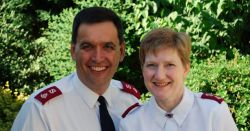Salvos build global partnerships in fight against extreme poverty

Director for the International Social Justice Commission Lt-Colonel Dean Pallnt (pictured left).
The Salvation Army has participated in a series of meetings in the United States which discussed the role of religion and faith in addressing some of the world's biggest problems, such as extreme poverty, conflict and security, governance, gender equality, and women's empowerment.
Leaders from the worlds of finance, development and faith-based organisations met in ground-breaking meetings in Washington DC and New York City to share perspectives on how these issues should be addressed.
Lieut-Colonel Dean Pallant, Director for the International Social Justice Commission and International Accountability Movement Coordinator, presented a paper outlining The Salvation Army's experience and participated in discussion panels.
A conference on “Religion and Sustainable Development: Building Partnerships to End Extreme Poverty”, was convened and co-hosted in Washington DC, by many organisations.
The conference brought together a unique combination of policy makers, multilateral and bilateral agencies, religious leaders, development professionals from faith-based organisations and academics. The aim was to connect frontline policy makers with religious and faith-based groups in the common cause of ending extreme poverty and promoting sustainable development.
Donors and development institutions are showing great interest in the role of religious and faith groups in providing evidence-based, scalable solutions towards achieving shared development goals. The conference presented a timely opportunity to expand the conversation from whether public sector and religious and faith-based groups can effectively collaborate to how it can happen.
The conference was set up to resource an open and vigorous discussion about the potential and challenges of faith partnerships with the public sector. It started with the launch of The Lancet medical journal’s series on “Faith-based Health Care”.
Lieut-Colonel Pallant presented a paper and shared a case study explaining The Salvation Army's work. He told the conference: “For some, the secularisation of the church and faith-based organisations is good news. I believe it is very bad news, particularly in parts of the world where extremists are hijacking religion for evil ends. This is not the time to leave a vacuum – it will be filled not by peace-loving secularists or evangelical atheists. In reality, the space is being filled by narrow-minded extremists who abuse faith for their own ends. It is in the interest of governments, the United Nations and the World Bank to partner with mature, responsible religious people and institutions and encourage faith-enriched practice.”
The issues of religion and sustainable development were debated from the perspectives of public sector leadership and religious and faith-based communities. Sessions also examined the evidence
base and key learning in relation to health systems strengthening, Ebola and HIV, sexual and gender-based violence, humanitarian assistance and disaster relief – each of which The Salvation Army has experience in. The issues of religion and politics were also debated, along with approaches to scaling up faith partnerships for development outcomes.
Report courtesy of IHQ
Comments
No comments yet - be the first.